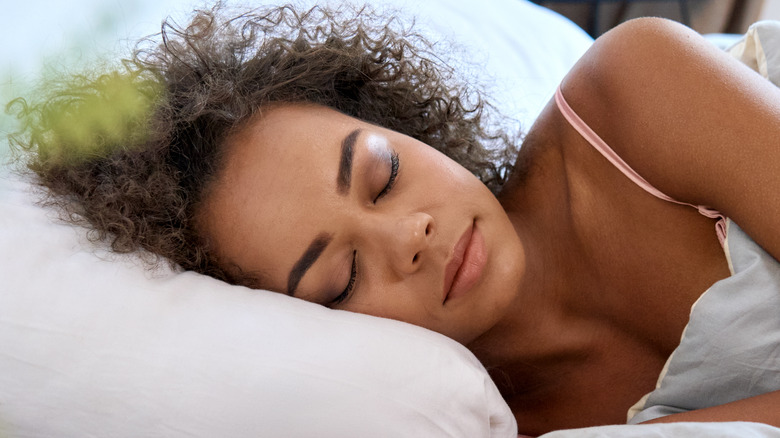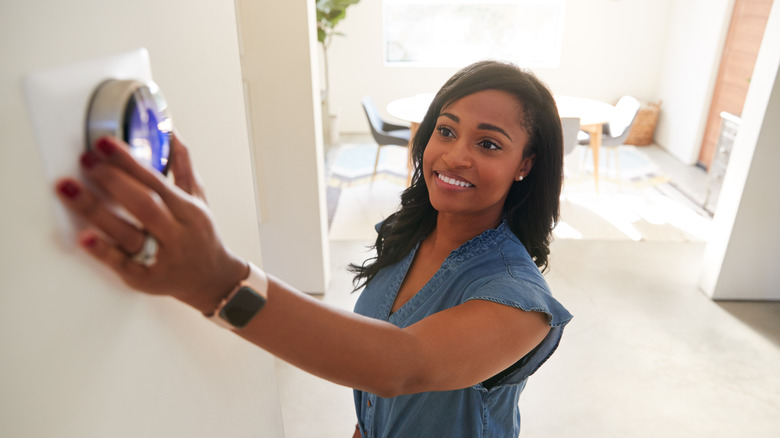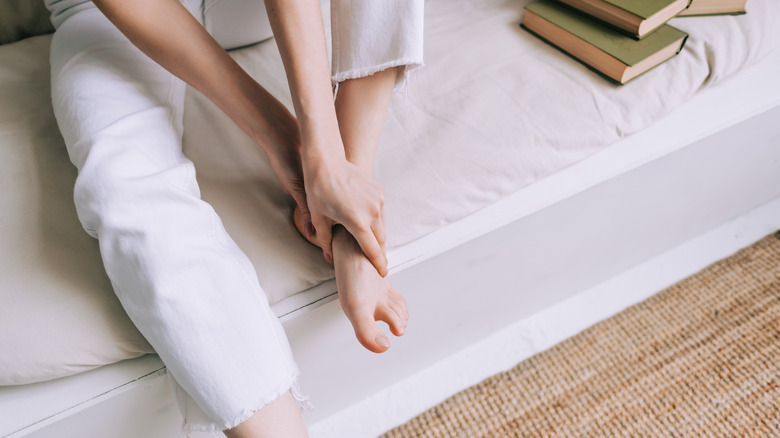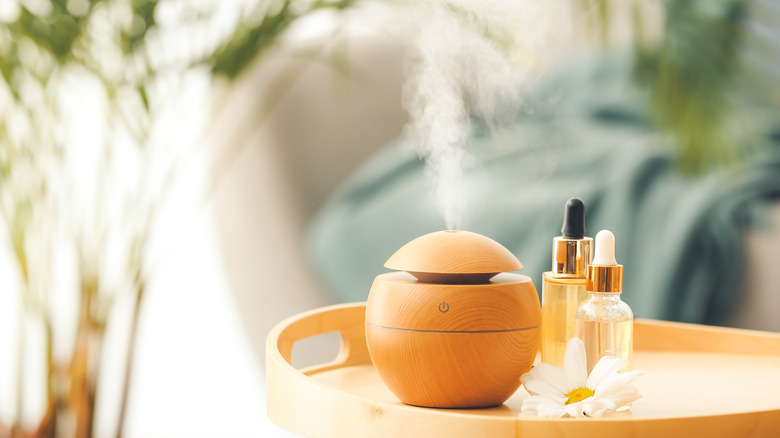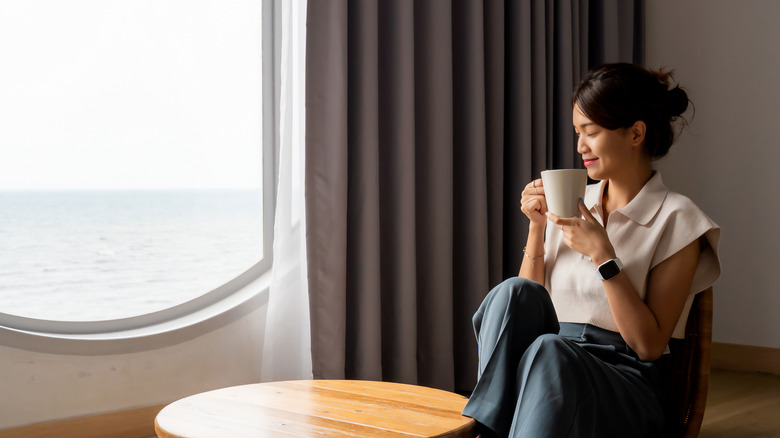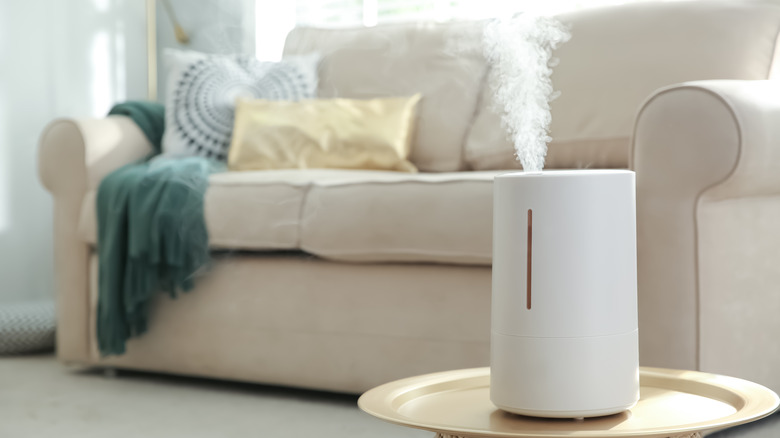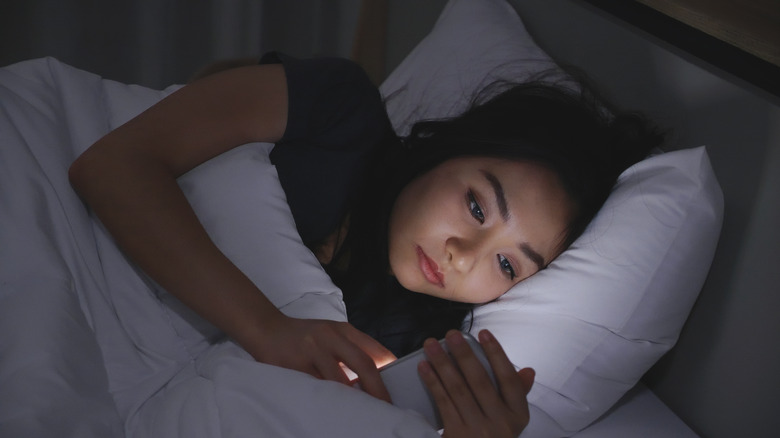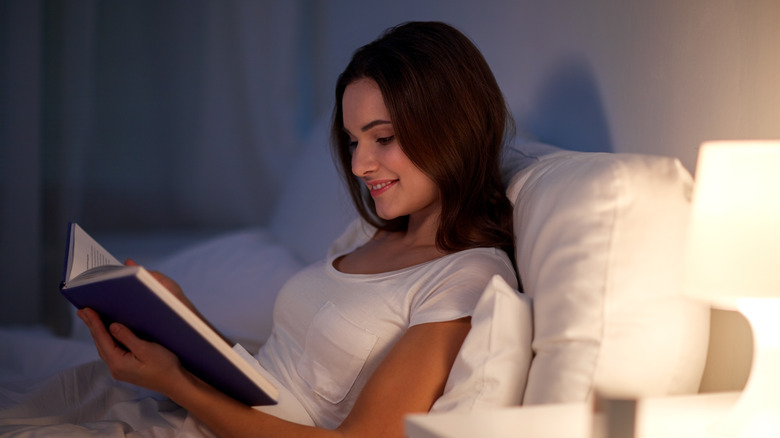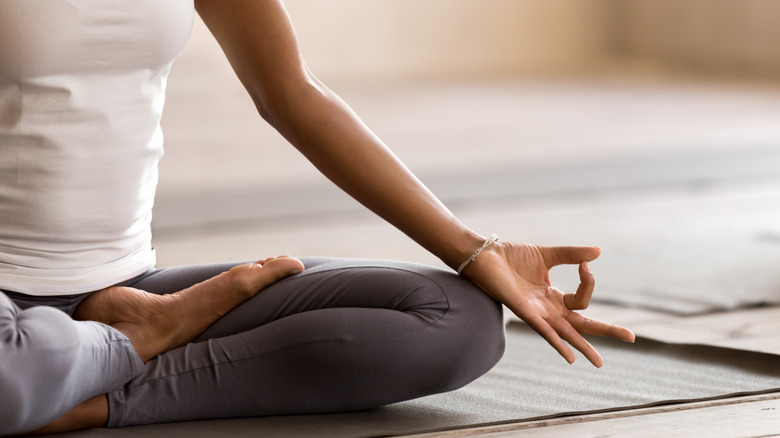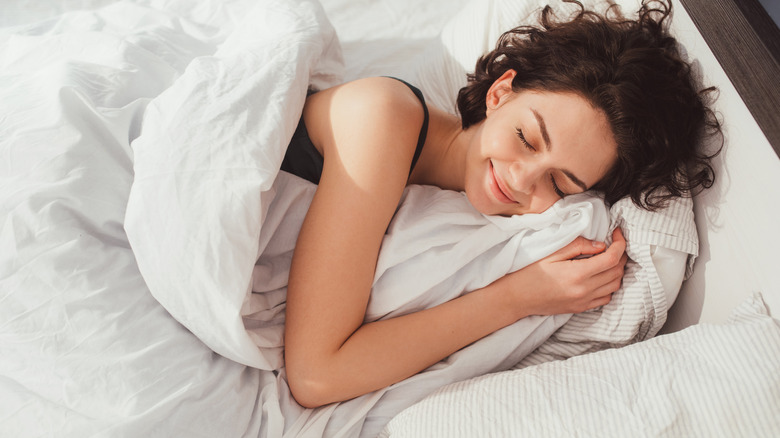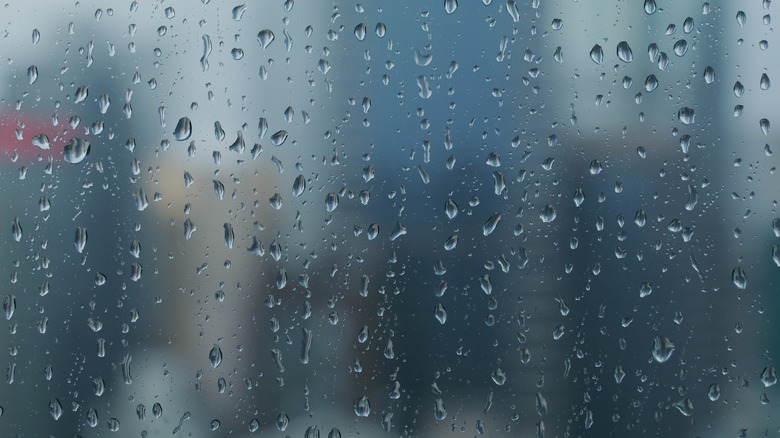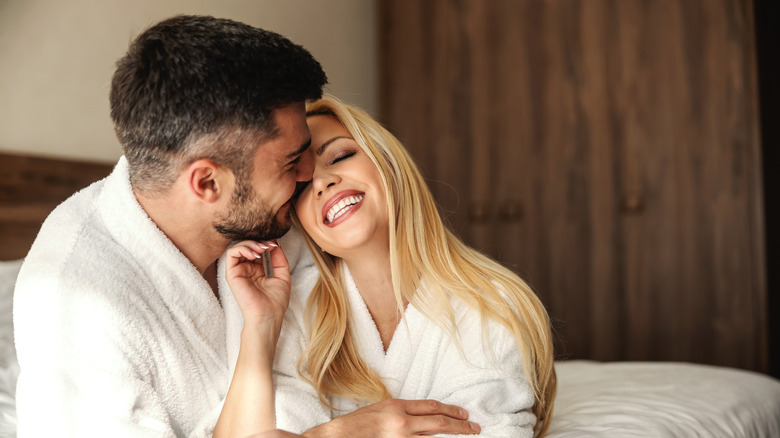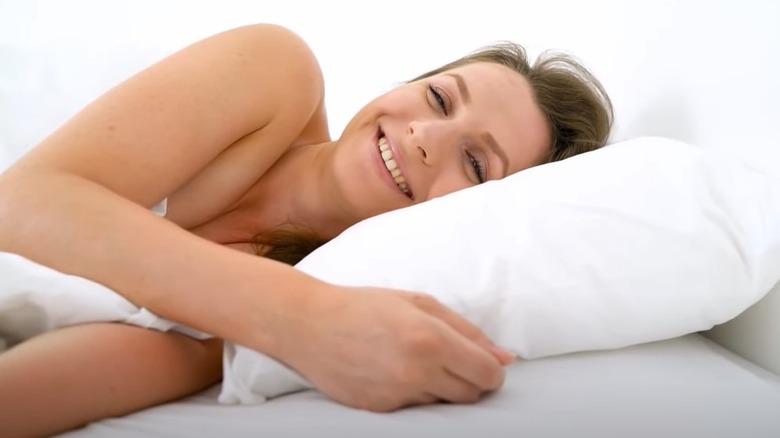Natural Hacks That Can Instantly Improve Your Quality Of Sleep
According to the Centers for Disease Control and Prevention, more than one-third of Americans don't get an adequate amount of sleep on a consistent basis. And what would fall under the definition of adequate? At least seven hours. And just what happens when people fall short of this bar? Well, there is plenty of data to support the fact that sleep deprivation can lead to all sorts of health issues including obesity, heart disease, high blood pressure, and — believe it or not – even a shortened lifespan.
So, what are some telling signs that you are indeed not getting as much sleep as you should? According to the Sleep Foundation, if you're moody, have a hard time concentrating, or feel constantly fatigued, those are pretty strong indicators that you could use more rest. Healthline added that if you're always yawning, your balance is off, you've got a low libido, you find yourself getting sick more often, or you notice that you have become more accident-prone, all of this also means that you probably need to catch more Z's.
But what if, no matter how many sheep you try to count at night, you struggle with either falling asleep or staying asleep? If that is indeed the case, there are some proven hacks that can improve your quality of sleep as soon as tonight, if you apply them.
Turn down your thermostat
If you're someone who feels chilly when you're first getting into bed only to find yourself wanting to kick your covers off in the middle of the night, you're not alone. WebMD shared that it's pretty common for body temperatures to fluctuate, not only during the day but at night as well. That said, if sleeping when you feel hot is something that you absolutely can't stand, something that you can do to make that less of an issue is to turn down your thermostat before turning in for the evening.
And what temp should your household be? According to the Sleep Foundation, somewhere between 60 to 67 degrees is a pretty good temperature. Not only will this help to keep you from waking up in a sweat, but an added bonus is that it can lower your energy bill too.
If you've never given this much thought, try it as soon as possible. A lowered thermostat could make you look forward to falling asleep — and feel relief at seeing next month's energy bill.
Give yourself a foot massage
Did you know that there are around 15,000 nerve endings in your feet? That's a part of the reason why reflexology can be so powerful when it comes to overall personal wellness; it's because it's all about focusing on applying pressure to different parts of your body — including your feet. According to mindbodygreen, since stimulating certain parts of your feet can soothe various parts of your organs or glands, focusing on the balls of your feet can actually help to relax your breathing.
In order to get the absolute best results, you should see a professional reflexologist, but you can definitely give yourself (or ask your partner to give you) a foot massage before bedtime to make you feel calm. If you apply some chamomile oil to your feet while you're massaging them, the properties in chamomile can cultivate a sedative effect that will further relax you. It's one of the best ways to treat yourself at night before going to bed and a great way to improve your quality of sleep.
Put some cedarwood essential oil into a diffuser
Something that you should get for a couple of different rooms in your house is a diffuser. Organic Facts shared that one of the main reasons why it's such a wise purchase is that, since heat can oftentimes affect the potency of essential oils and many diffusers don't require heat in order to function, you can get all of the benefits that essential oils have to offer by using one. Plus, diffusers are great at eliminating odors, boosting immunity, helping to manage your appetite, decreasing anxiety levels, and, yes, improving your sleep. Although there are all kinds of oils that you can put into your diffuser to promote a good night's rest, a top one to consider is cedarwood.
WebMD states that cedarwood is an essential oil that reduces bodily inflammation, decreases your blood pressure, and works as a pretty effective sedative. However, it's a good idea to keep in mind that you may need to use the oil for around 20 days before seeing any lasting benefits (via the Sleep Foundation). In the meantime, its spicy-woodsy scent makes it a very pleasant scent to enjoy.
Sip on some magnolia tea
As far as teas go, you probably don't hear about magnolia as much as you probably should. But when it comes to a tea that has a myriad of health benefits, it's definitely one to strongly consider. Both the flowers as well as the bark from this particular plant has been known to contain all kinds of medicinal properties — ones that help to soothe respiratory issues, relieve period cramps, prevent gingivitis, improve the state of your liver, and even encourage weight loss (via Organic Facts).
The reason why magnolia tea is something that you may want to sip on before heading to bed is it can also help to reduce anxiety levels. That's because it also contains properties that can bring balance to your endocrine system. One study published in Food Science & Nutrition even revealed that many postpartum women who drank the tea for three consecutive weeks experienced less depression-related symptoms, which helped them to sleep so much better.
Get a humidifier for your home
If you don't already own a humidifier, there's no time like the present to invest in one. Since they're specifically designed to put moisture into the air, health-wise, they are good for you because they can help to keep your skin moisturized and ease flu and even COVID-19 symptoms (per USA Today). Also, if you or your partner are heavy snorers, a humidifier can soothe nasal passages, which can reduce those sleep-interrupting sounds as well (via Medical News Today).
All of these things alone make it obvious how using a humidifier in your bedroom can help you to get a better night's sleep. However, Well+Good shared that humidifiers can also bring relief to allergy and asthma sufferers who are trying to get some quality rest. Also, since your bedroom should have somewhere between 40 to 60% humidity in it (and many don't), a humidifier can bring your space up to that level, which is also good for plants and even the wallpaper in your home.
Turn your smartphone off and keep it off
It probably comes as no surprise to you that around 40% of Americans go to bed with their smartphone either in their hand or by their side, according to the Sleep Foundation. There are all kinds of reasons why this isn't a very smart practice if you're trying to get some quality sleep.
For one thing, most phones (and laptops and tablets) come with a blue light that can alter how your system produces melatonin; when this happens, that can make it hard for you to fall asleep. Not only that but constantly staring at your social media pages, reading the news, or even streaming shows on your phone can keep your mind so preoccupied that it's difficult to relax. Also, checking your phone before turning in can mess with your REM (rapid eye movement, as explained by WebMD) sleep too.
That's why the Sleep Foundation recommends turning off all electronics approximately an hour before going to bed. It will give your mind and body time to decompress so that you can get calmer more quickly, which is ideal when you're trying to get some much-needed sleep.
Read, but don't read an e-book
If in your mind, you're thinking, "No problem. Instead of surfing on my phone, I'll just read a book on my e-reader" — not so fast. E-readers still emit a similar blue light that can ultimately wreak some level of havoc on your melatonin levels too. Not only that but some studies reveal that those same lights can make it difficult to feel awake and alert the following morning.
Not to say that you aren't onto something when it comes to checking out a few chapters before turning in. After all, Real Simple shared that one 2009 study found that reading can help to lower stress levels by as much as 68%. Plus, reading can help to alert your system that it's time to slow down and prepare your body for sleep. So, definitely crack open a book. Just make sure that it's an "old-fashioned" one — one where you literally have to turn the pages with your hands.
Do a little bit of 4-7-8 breathing
When it comes to breathing, most of us don't give it much thought unless we've got a cold that comes with a stuffy nose. But the reality is that focusing on different breathing techniques can do wonders for your overall health and well-being. For instance, did you know that deep breathing can help to reduce anxiety levels, help you to better cope with stress, and even make it easier to focus on various tasks on your to-do lists (via Verywell Mind)?
Something else that certain breathing techniques can do is significantly increase your quality of sleep. One technique that can make this happen is called the "4-7-8 breathing technique." Medical News Today shared that this technique is all about deep inhaling through the nose for a count of four seconds, holding your breath for a count of seven seconds, and then exhaling through the mouth for a count of eight seconds.
Because it is a type of rhythmic breathing that is used in meditation and yoga, some health experts believe that it can calm your system down, so that you're able to fall — and stay — asleep easier.
Imagine something soothing to relax your mind
Be honest. When it's time to go to bed, how often do you find yourself worrying about a bill that needs to be paid, a work project that's due, or even what you're going to make for dinner the following evening? It can be really hard to get the rest that you need when your mind is going a mile a minute. This is where imagery distraction comes in.
If you've never heard of it before, imagery distraction is what happens when you choose to take your mind off of things that potentially stress you out and instead focus on thoughts or images that are pleasant and help to relax you. As shared in a 2002 study published in Behaviour Research and Therapy, scientists learned that this practice can be especially helpful for people who experience insomnia.
Yes, there is some irony in the fact that it requires some effort to wire your brain to think about relaxing things. Still, once you get the hang of it, you might find imagery distraction to be one of your favorite things to do at the end of the day and can help improve your quality of sleep.
Listen to some rain or ocean waves
If you've ever gone on vacation to a place that's by an ocean and you found yourself getting some of the best sleep that you've ever had in your entire life, believe it or not, there is actually something to that. Orfeu Buxton, an associate professor of biobehavioral health at Pennsylvania State University, told Live Science, "These slow, whooshing noises are the sounds of non-threats, which is why they work to calm people."
Does this mean that you can only get this quality of sleep once or twice a year? Absolutely not. Thanks to platforms like YouTube, there are ASMR videos of ocean waves, rain falling, and all kinds of other water-related sounds that you can listen to for free for hours on end. Just go to the site and put the particular sound that you're looking for in the search engine.
Also, it should go on record that one study published in Frontiers in Neurology revealed that people who opt to sleep with white noise are able to improve their ability to fall asleep by as much as 38%. It's definitely something to consider when it comes to creating a consistent nighttime routine.
Enjoy a round or two of sex
The health benefits that come from engaging in physical intimacy are countless. As noted by the Center for Women's Health, it helps to lower your blood pressure, strengthen your immune system, decrease pain levels, reduce feelings of depression and anxiety, and boost your self-esteem.
When you take all of this into consideration, it probably comes as no surprise that sex can serve as the ultimate precursor to sleep as well. While there are a few reasons why this is the case, the main one is, whenever you experience an orgasm, two natural hormones that are released are oxytocin and prolactin — both of these can help to make you feel pleasure and comfort. They also help to relax you. Something else that happens during sex is your cortisol levels (your stress levels) drop, which is also super helpful (via the Sleep Foundation).
That's why, if your male partner seems to fall asleep right after sex, you shouldn't take it too personally. It's not something that he consciously does; it's all tied into how his body works (via Live Science).
Definitely sleep naked
If you're not sleeping naked — why the heck not? When it comes to a hack that helps you to sleep comfortably and soundly, sleeping naked is going to make the top of the list each and every time. That's because going to bed without any of your clothes on will not only help to keep your body temperature regulated, it will also improve the quality of your skin, lower stress levels, help to keep your vagina healthy (because sleeping naked helps it to "breathe"), and, if you're currently in the process of trying to conceive, if your male partner sleeps naked too, it can boost his fertility levels (via Healthline).
Since research reveals that sleeping naked can also help to relieve anxiety, it probably makes perfect sense why you should sleep in the buff just as often as you possibly can. Just make sure that you go with sheets that are made out of cotton, bamboo, Tencel, or silk. The fabrics that you are lying on need should be breathable (via the Sleep Foundation). Sleep well.
